High pH fruit juice refers to beverages made from fruits that have an alkaline effect on the body after digestion. While most fruit juices are acidic in their natural state, some can produce alkaline byproducts when metabolized. This article explores the concept of high pH fruit juices, their potential health benefits, and how to incorporate them into your diet.
What Are High pH Fruit Juices?
High pH fruit juices are beverages that, despite their initial acidity, have an alkalizing effect on the body after digestion. These juices can help balance the body’s pH levels and potentially offer various health benefits.
Which Fruits Produce High pH Juices?

While most fruits are acidic in nature, some have alkaline-forming properties when metabolized:
- Watermelon
- Cantaloupe
- Honeydew melon
- Cucumber (technically a fruit)
- Coconut water
It’s important to note that even acidic fruits like lemons and limes can have an alkalizing effect once metabolized.
What Is the pH Scale and How Does It Relate to Fruit Juices?
The pH scale measures the acidity or alkalinity of a substance:
- 0-6.9: Acidic
- 7: Neutral
- 7.1-14: Alkaline
Most fruit juices fall on the acidic side of the scale:
| Fruit Juice | pH Range |
|---|---|
| Lemon | 2.0-2.6 |
| Lime | 2.0-2.8 |
| Orange | 3.3-4.2 |
| Apple | 3.3-4.0 |
| Grape | 3.3-4.5 |
However, the pH of the juice itself doesn’t necessarily reflect its effect on the body after digestion.
How Do High pH Fruit Juices Affect the Body?
When consumed, high pH fruit juices can:
- Support alkaline balance in the body
- Provide essential vitamins and minerals
- Offer hydration benefits
- Potentially reduce inflammation
What Are the Potential Health Benefits of High pH Fruit Juices?
Consuming high pH fruit juices may offer several health benefits:
- Improved bone health
- Enhanced muscle function
- Better kidney health
- Reduced risk of chronic diseases
How Can You Make High pH Fruit Juices at Home?
Here’s a simple recipe for a high pH fruit juice:
Alkaline Green Juice
– 1 cucumber
– 2 celery stalks
– 1 green apple
– 1/2 lemon
– 1-inch piece of ginger
Juice all ingredients and enjoy immediately.
Are There Commercial High pH Fruit Juices Available?
While not many brands specifically market their juices as ‘high pH’, some options include:
- Coconut water brands (e.g., Vita Coco, Zico)
- Cold-pressed watermelon juices
- Green juices containing alkaline-forming ingredients
How Often Should You Consume High pH Fruit Juices?
While high pH fruit juices can be beneficial, moderation is key. Aim for:
- 1-2 servings per day
- As part of a balanced diet
- Not as a replacement for whole fruits and vegetables
What Are Some Precautions When Consuming High pH Fruit Juices?
Consider the following when incorporating high pH fruit juices into your diet:
- Sugar content: Even natural fruit sugars can affect blood glucose levels
- Fiber loss: Juicing removes beneficial fiber from fruits
- Calorie intake: Fruit juices can be calorie-dense
- Dental health: Acidic juices can erode tooth enamel
How Do High pH Fruit Juices Compare to Other Beverages?
Here’s a comparison of various beverages and their pH levels:
| Beverage | pH Range |
|---|---|
| High pH Fruit Juice | 6.0-7.5 |
| Water | 7.0 |
| Coffee | 4.5-5.5 |
| Soda | 2.5-3.5 |
| Green Tea | 7.0-10.0 |
What Are Some Myths About High pH Fruit Juices?
Common misconceptions include:
- They can dramatically alter blood pH
- They cure diseases
- All fruit juices are alkaline-forming
It’s important to approach health claims critically and consult with healthcare professionals.
By understanding high pH fruit juices and their potential benefits, you can make informed decisions about incorporating them into your diet. Remember, while these juices can be part of a healthy lifestyle, they should complement, not replace, a balanced diet rich in whole fruits and vegetables.
References:
1. Livestrong: What Juice Raises Your pH?
2. Weekand: The pH Levels of Apple, Orange, Grape & Cranberry Fruit Juices
3. Greatist: All About Alkaline: The Best Drinks for a Balanced pH
4. Healthline: Alkaline Water: Benefits and Risks
5. WebMD: Alkaline Diet: Pros, Cons, and What You Can Eat
